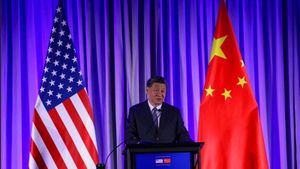The ever-evolving discussion around Germany’s Bürgergeld, or citizen's allowance, has reached new heights, particularly with the upcoming elections set to take place in February 2025. This social welfare program, originally intended to provide financial assistance for those unemployed or underemployed, faces significant pressure as political factions vie for control and influence over the future of social services.
Recent developments indicate the CDU/CSU, Germany's center-right political alliance, is aggressively pushing for radical reform of the welfare system. Under their proposal, the Bürgergeld could be dismantled entirely and replaced by what they are calling 'Neue Grundsicherung' or New Basic Security. On the surface, this initiative aims to shift the paradigm of social assistance back to the traditional 'Fördern und Fordern' or 'Support and Demand' model, emphasizing the need for recipients to actively seek employment.
Thorsten Frei, the First Parliamentary Managing Director of the CDU/CSU, discussed this proposal on ZDF’s talk show hosted by Markus Lanz. He pointed out the astonishing number of current Bürgergeld recipients — around 5.6 million. Frei believes approximately 1.7 million of these individuals are capable of work yet remain inactive, leading him to question the justification behind their continued financial support. He argued for the necessity to ‘activate’ this group onto the labor market, projecting potential savings of €30 billion each year for the state if successful.
Yet, the practicality of these assertions raises significant questions. Critics argue the underlying issues are far more complex than simply creating more job opportunities. Many of these individuals face substantial challenges, including limited qualifications and lack of educational credentials, making them difficult to place within the job market.
Further complicate matters, the proposed approach suggests no changes would be made to the current benefit level of the Bürgergeld, which stands at €563 for single adults, as mandated by the Federal Constitutional Court. The CDU/CSU maintains they won’t reduce payments for the truly needy, as Frei asserted, emphasizing their intent not to jeopardize those who urgently require assistance.
Meanwhile, as political winds shift, Bürgergeld beneficiaries are bracing for what may very well be tighter regulations and scrutiny. Recent discussions indicate stricter job-finding mandates are on the horizon. This includes the potential for severe sanctions where individuals who fail to attend job center appointments or reject suitable job offers will be penalized. Currently, about 14,000 recipients have already been subjected to sanctions this year — illustrating the gravity behind non-compliance with job-search protocols.
Looming on the horizon is the possibility of austerity measures combined with rising living costs for those relying on social benefits. The announcement of zero increases to the Bürgergeld payment for 2025 has sparked outrage among advocacy groups and beneficiaries alike. Many are now worrying about the cumulative effects of inflation and increasing utility costs against the backdrop of stagnated benefit levels. Specifically, households utilizing electricity are bracing for potential surges due to regional electricity price hikes anticipated next year.
For 2025, the methodology for calculating the required support for beneficiaries is uncertain, particularly for those who need to cover soaring electricity costs, as the basic allowance (only €47.71 per month assigned for power) appears glaringly insufficient. This concern was articulated by multiple social service experts who have advised continued pressure on lawmakers for revisions to financial support structures to adequately reflect consumer realities.
The net total of benefits derived from the Bürgergeld acts as lifeblood for many; predictions suggest many recipients might find themselves at even greater risk of financial distress should the legislation shift as outlined by the CDU/CSU. Their approach to eliminate loopholes, focusing on reducing welfare dependency, inherently risks exacerbation of hardships faced by low-income families.
Meanwhile, should the potential for the CDU's proposed reforms build traction, apprehension circles around how it might impact the efficiency of job market integration for those receiving assistance. The critics voice concerns around the adequacy of current frameworks to transition people effectively from assistance to sustainable employment.
On the other hand, proponents of the Bürgergeld argue it already provides foundational empowerment by simplifying access to financial support and job-seeking resources. Should this program meet its demise, advocacy groups warn of serious ramifications not only on the individuals who rely on it but on the broader socio-economic fabric of the nation as well.
The upcoming elections present yet another avenue for the discourse surrounding social welfare policies. With the nation watching closely, both proponents and opponents of the current systems brace for the political transition. The outcomes may very well redefine the social contract between the state and its citizens for years to come.
To summarize, the fate of the Bürgergeld is tightly interwoven with broader political machinations and electoral strategy. Its provision, which blossomed as a necessary tool for engagement and support, stands at the precipice of potential overhaul under new political consensus.
While the debates continue, it remains to be seen how policymakers will reconcile the demands for both fiscal responsibility and the imperative to support their most vulnerable citizens amid rapidly changing socio-economic climates.



